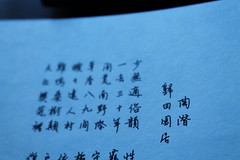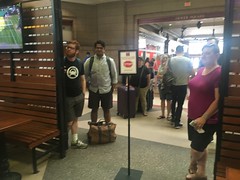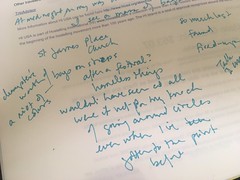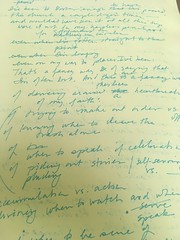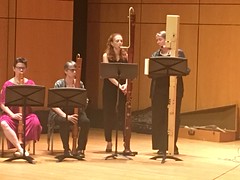… and, it being the rare First Sunday I could sleep in, I did, and that was delicious. So is the tomato jam a friend canned last summer, which I have put on an English muffin.
A hummingbird explored trying to get in through the left kitchen window earlier in the hour, and I startled a deer when I flung my old pie weights (umpteen-year-old white beans that had become too smelly during last week’s baking) into the compost heap.
September is here, and I inevitably reread Louis MacNeice’s Autumn Journal during the month. Nazlan Ertan has a fine take on both the love and politics that make it moving (and, in where the politics are concerned, resonate anew, in ways that do not bode well). I have just ordered Autumn Sequel, which for some reason hadn’t stayed on my radar before (perhaps because I was more attuned to other themes when I picked up the biography of MacNeice I read sometime during the last decade). I still own Rosamunde Pilcher’s The Shell Seekers, the novel that introduced me to “September has come and it is hers …” to begin with.
Needing space and cash, I put all my Pilchers except Shell Seekers and Flowers in the Rain into the resale bag some while ago, deeming those two volumes sufficient for future comfort reads. Shell Seekers is more satisfying than say, Coming Home in part because the characters’ touchstones are better integrated. Fond as I am of “Jesu, Joy of Man’s Desiring,” it isn’t integrated into Coming Home‘s central love story as deftly as “September” appears and reappears in The Shell Seekers. Which is to say, just twice in both cases, but in The Shell Seekers, they really count.
Ironically, as a professional editor, I periodically have to discourage authors from quoting from songs or poems, because publication schedules often preclude securing the reproduction rights in time. (“Fair use” doesn’t cover squat where commercial works are concerned.) It makes me sad in part because fiction has so often served as the gateway to poems that now run deep in my veins. Becoming hooked on Dorothy L. Sayers as a teenager led me to John Donne. The stories of Sherlock Holmes (which were responsible for my becoming interested in Sayers, after WEKU broadcast a dramatization of Strong Poison in the slot formerly reserved for the Holmes tales) were where I first encountered certain lines of Shakespeare (chief among them “Journeys end in lovers meeting”).
I just spent the better part of an hour happily revisiting Bill Richardson’s “Bachelor Brothers” trilogy, which was published in the 1990s. As Richardson himself observed, the first book did well and the sequels not so much — with reason, I have to say. I myself found the Solomon Solomon subplot more tedious than entertaining. But all three books contain gems both in the way of funny-moving vignettes and choice quotations, and they introduced me to Margaret Atwood’s “Variation on the Word sleep” and Charles Mackay’s “I have lived and I have loved.”
In quoting the Mackay, Richardson wisely includes only the first ten lines; the poem wouldn’t have gripped me as it did (nor worked within the story it was stitched into) had the final quatrain been present. My subsequent search for the original ended up being a mini-saga — it is not in de la Mare’s Come Hither (which I own, thanks to Richardson’s alluding to it), and it wasn’t until 2015 and an inspired online search that I learned who had written it (and that it is in a different de la Mare anthology).
You could infer from all this that sleep — and well-deserved rest — has been much on my mind lately. Two mentor-friends passed away earlier this year, and I just received an unexpected bequest from a third. All three had lived long, productive lives, and were generous to me with attention and encouragement:
David Bevington
Nancy Ransom
Susan Z. Diamond
Not unrelated to all this is a piece Richardson published this year on having “used to be someone” who is now — happily — a part-time dishwasher. I think of my conversations with several friends (especially Joanne) about the jobs we accept and/or choose based on how they balance with our writing and publishing (a)vocations. I’m in the camp of being happiest with a corporate job where the metrics, performance reviews, and compensation operate in tandem with the prowess of my left brain (one of my favorite responses EVER to my editing has been a colleague muttering that I had no poetry in my soul), because the writing’s way more fun for me when it’s separate from what I professionally have to do. That said, there are also those nights where what I’m writing becomes something I have to do before my hamster brain will let me sleep, and then of course I run into the age-old problem of the day job’s demands draining from me some of the energy and stamina that would likely make good writing crystallize sooner (not to mention missed ops and faltering sparks — I look back at my relationships with David, Nancy, and Susan, and in all three cases wish I had done a better job with various projects, proposals, and paths they had a hand in. The lyf so short, the craft so longe to lerne…). And it’s not just the day job, but the aging house, the aching body, the ongoing friendships to tend (and sometimes mend), and one’s own need for sleep amid the piles on the counter and the porch to attend to.
(I will make my next post here about something other than Ars longa, vita brevis. I promise.)


